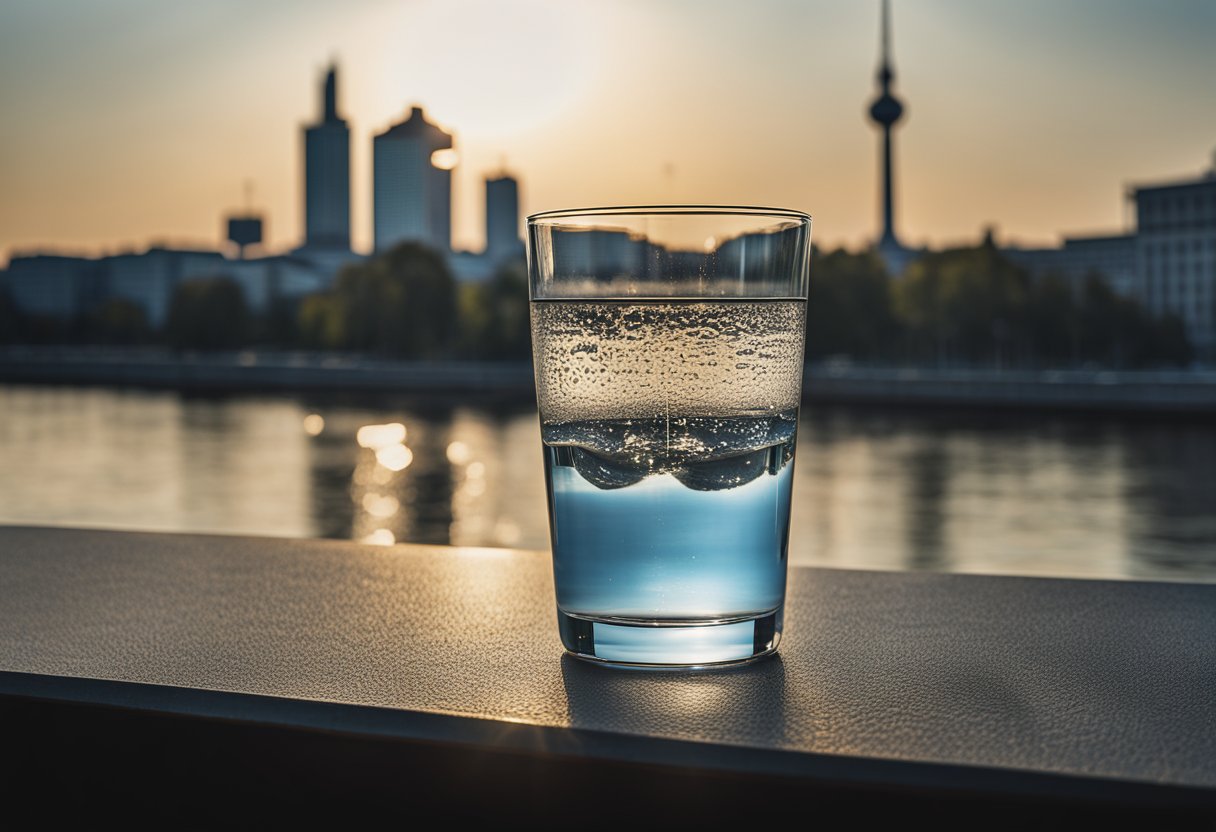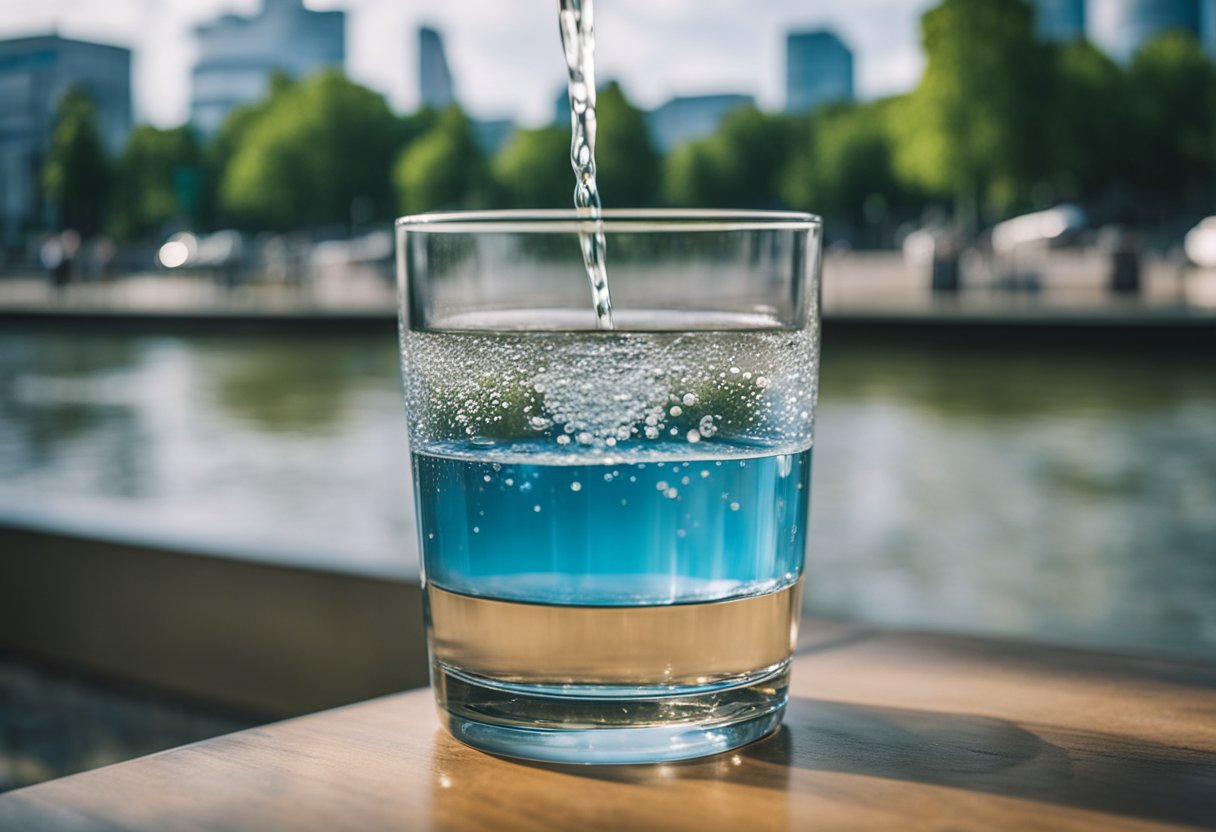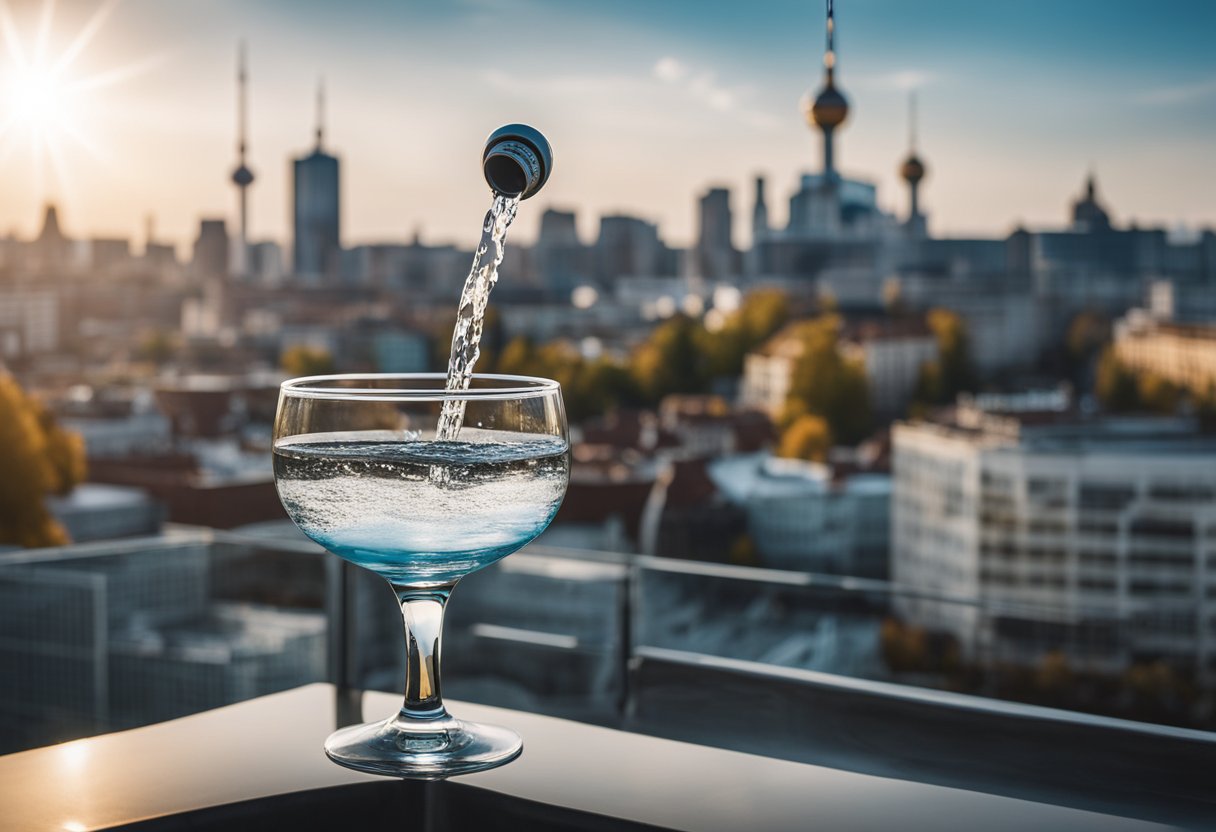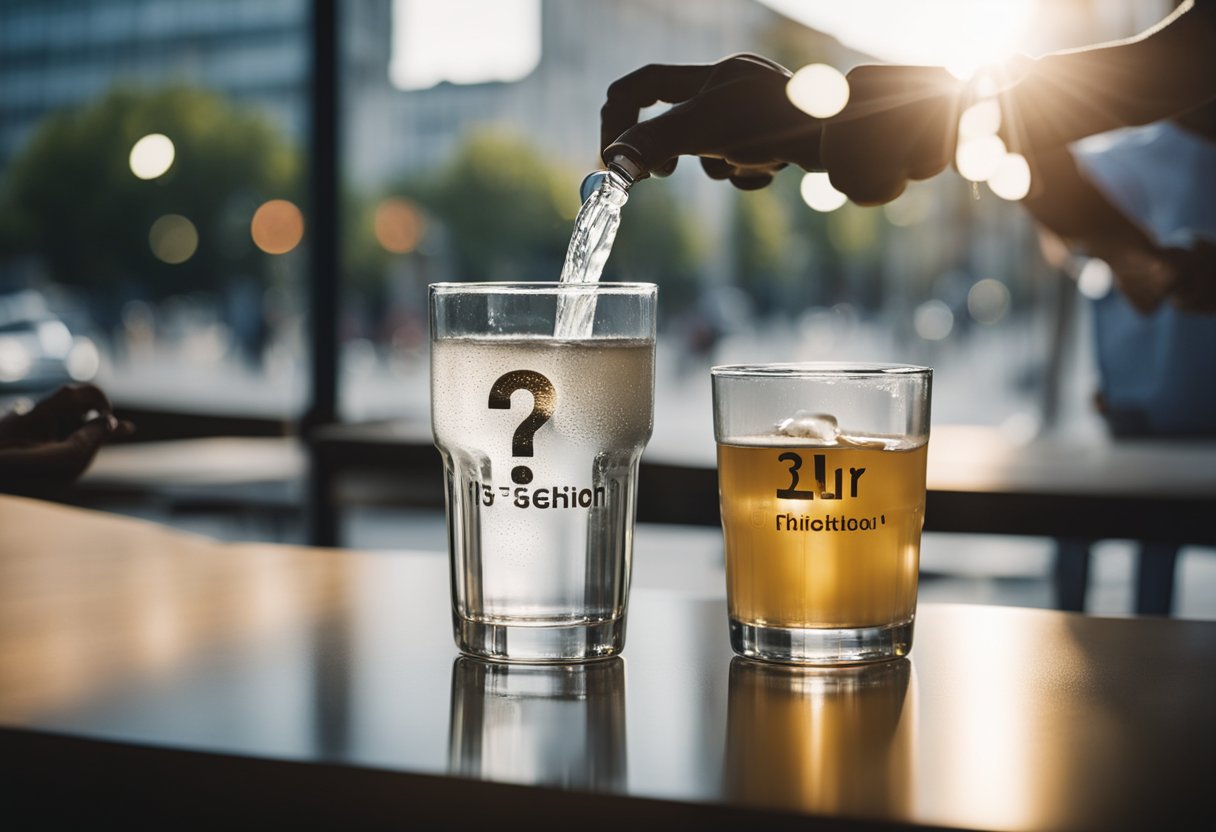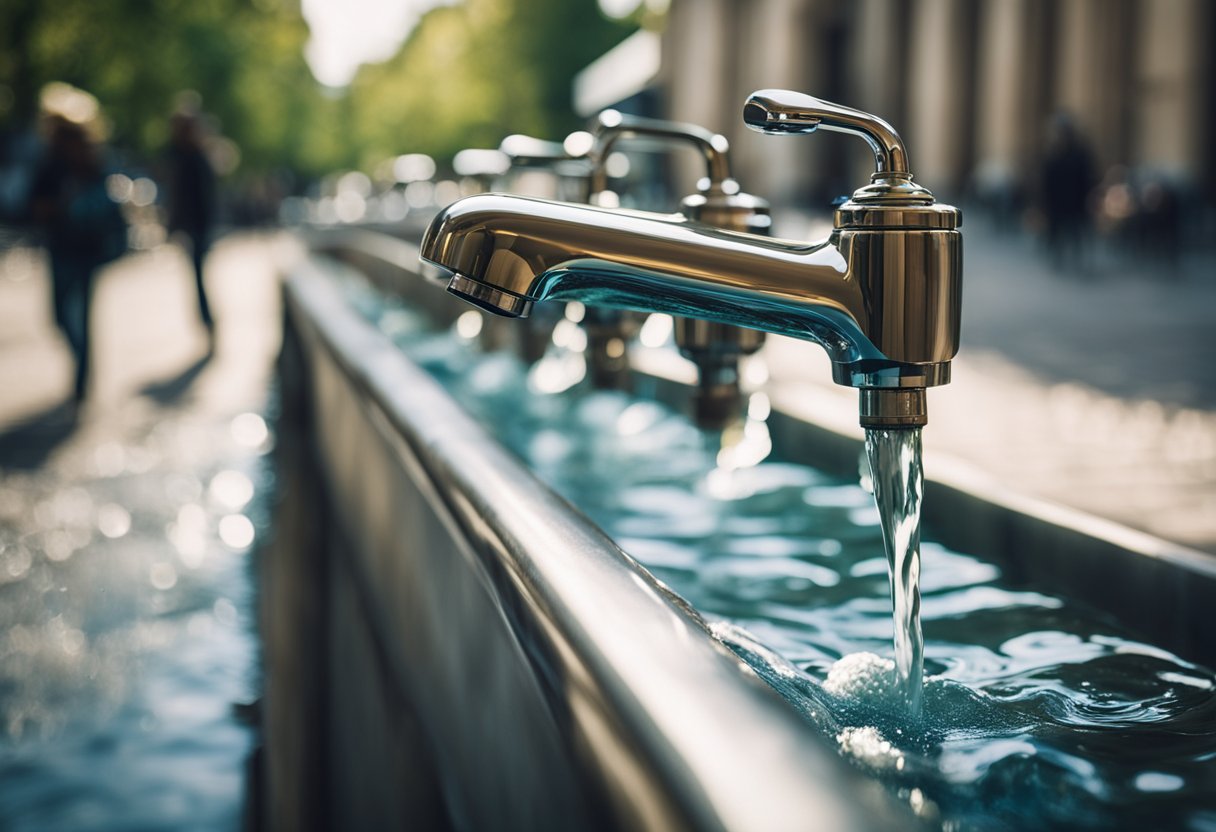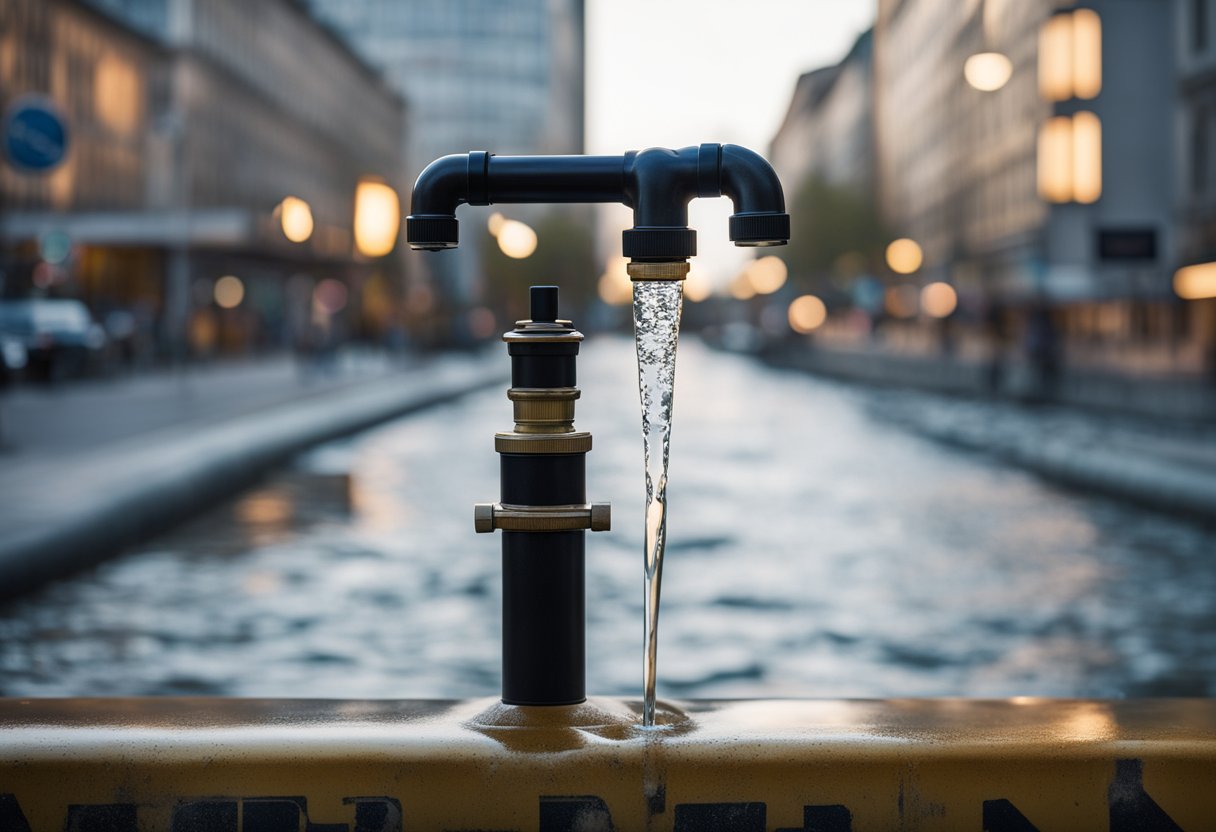When we travel to a new city, the question of whether tap water is safe to drink often comes up.
For those of us visiting or moving to Berlin, it’s reassuring to know that the city takes pride in the quality of its tap water.
In Berlin, we’re fortunate to have access to water that meets high health and safety standards, making it generally safe to drink.
- Berlin’s tap water is 99.9% pure, meeting the highest quality standards.
- Over 95% of Berlin residents trust and regularly consume tap water as their primary source of drinking water.
- The tap water in Berlin undergoes more than 10,000 tests per year to ensure its safety and purity.
- Approximately 90% of hotels and restaurants in Berlin serve tap water to their customers without any concerns.
With an annual consumption of over 200 million cubic meters, tap water represents more than 70% of all drinking water consumed in Berlin.
Can you drink the tap water in Berlin?
Tap water in Berlin is sourced from natural groundwater and surface water, which goes through rigorous purification processes to ensure its safety and quality. We can drink tap water here with confidence, and it’s a great way to stay hydrated without having to rely on bottled water. This not only helps us, but also benefits the environment by reducing plastic waste.
Moreover, by choosing to drink tap water in Berlin, we contribute to the sustainable use of resources. The water is regularly tested and treated to adhere to strict regulatory standards, ensuring that every glass we drink is as refreshing and safe as the last.
It’s no wonder that many locals and visitors alike carry refillable water bottles and tap into the city’s supply for a drink.
Overview of Berlin’s Water Source
In Berlin, our tap water is sourced primarily from groundwater and, to a lesser extent, surface water, ensuring its abundant availability and high quality. Our water supply system adheres to the German Drinking Water Ordinance, guaranteeing the safety and cleanliness of your drinking water.
Groundwater and Surface Water
The majority of Berlin’s tap water originates from groundwater, which is naturally purified and thus contributes significantly to the excellent quality of our drinking water. The groundwater is supplemented by surface water, which is also carefully treated to meet strict safety standards. The balancing act between these two sources ensures a continuous and reliable supply to the city’s residents.
Berlin Waterworks System
The Berlin Waterworks System manages and maintains the infrastructure that harnesses Berlin’s groundwater and surface water. It’s through this well-organized system that we implement the provisions of the German Drinking Water Ordinance. This involves intricate processes of collection, purification, and distribution, ensuring that whenever we turn on our taps, the water is not just safe, but also pleasant in taste.
Drinking Water Quality in Berlin
We find Berlin’s drinking water to be highly regarded for its quality, undergoing rigorous treatment processes and safety assessments to ensure it meets high standards for both chemical and microbial safety.
Water Treatment Processes
In Berlin, we treat our water with the latest technology to remove impurities and improve taste. Purification methods include sand filtration, which naturally retains contaminants, and advanced processes to balance the minerals such as magnesium and iron found in the water.
Chemical and Microbial Safety
Our water is carefully examined to meet strict safety standards, with tests for harmful chemicals conducted regularly. Organizations like Stiftung Warentest play a significant role in evaluating the water’s chemical profile, ensuring it does not contain hazardous levels of any substance.
Testing and Regulation
We adhere to stringent testing and regulation protocols. Stiftung Warentest, amongst other regulatory bodies, ensures the water quality remains high, and environmental sustainability is considered, providing peace of mind about the tap water’s purity.
Lead Pipes and Infrastructure
We address concerns regarding lead pipes and infrastructure with transparency. Replacement programs target areas at risk, minimizing any lead contamination. The use of lead pipes has been significantly reduced, ensuring that our water infrastructure is not only safe but also environmentally responsible.
Environmental Considerations
In the context of Berlin, comparing bottled water to tap water usage and the associated environmental impacts is crucial. We need to weigh the consequences of plastic waste on ecosystems and consider how natural resources are managed to meet our consumption needs.
Bottled vs. Tap Water
The choice between bottled water and tap water has a significant environmental footprint. Opting for tap water in Berlin not only upholds the city’s commitment to treating water as a human right, but it also supports a more sustainable approach to consumption. Bottled water, while convenient, can be resource-intensive to produce and transport, consuming more natural resources and energy compared to the readily available tap water.
Plastic Waste Reduction
By choosing tap water and reusable containers, we contribute to a substantial reduction in plastic waste. This practice is aligned with Berlin’s initiative to expand the number of drinking fountains, encouraging the use of refillable water bottles, and decreasing our reliance on single-use plastics. Such efforts are pivotal in managing waste more effectively and preserving the environment.
Natural Resource Management
The sustainability of natural water sources in Berlin hinges on responsible resource management. Drinking tap water supports the efficient use of our water supply system, limiting unnecessary extraction and processing that could deplete natural resources. Berlin’s tap water, being sourced from groundwater that is naturally purified, stands as a testament to the city’s excellence in water resource management.
Health and Safety Aspects
In this section, we’ll explore the aspects of health and safety related to drinking tap water in Berlin. We’ll examine potential contaminants and the robust protocols in place to ensure water safety. Our focus is also on adherence to water ordinances and the presence of bacteria and limescale, elements critical to the discussion of tap water’s safety.
Potential Contaminants
Berlin’s tap water is regarded as safe to drink; however, it’s important to be aware of potential contaminants like heavy metals, which can originate from lead pipes still present in some older buildings. The city’s waterworks conduct rigorous testing to minimize these risks.
Safe Drinking Protocols
Safe drinking protocols in Berlin involve the double-filtration of water and continuous monitoring, which meet high safety standards to ensure that the tap water is safe to drink. When using water fountains around the city, it’s reassuring to know that the same level of care is extended to these public water sources.
Water Ordinance Compliance
Our water ordinance compliance is stringent, and we continuously invest in our infrastructure to replace any old lead pipes, enhancing the safety of the water distribution network. This ensures that water reaching your tap adheres to strict safety standards.
Bacteria and Limescale
Concerning bacteria and limescale, the former is typically not an issue due to high water treatment standards. Limescale, on the other hand, is a common mineral buildup noticeable in Berlin’s water, but it does not pose a health risk and is often more of a practical concern for maintaining household appliances.
Cultural Context of Water Consumption
In Germany, the cultural nuances regarding water consumption are distinct and carry their own set of preferences and perceptions. We’ll explore the public views on water, what travelers can expect in restaurants, and the notable inclination towards carbonated water.
Public Perception and Preferences
Germans have a reputation for prizing quality in their tap water, and rightfully so, given that German tap water is among the highest quality in the world. However, there is a curious paradox at play: despite its safety and quality, many locals prefer bottled water. This preference can be attributed to cultural habits and taste rather than concerns about health or cleanliness.
Restaurant and Traveler Experiences
As a traveler in Germany, expect that asking for water in a restaurant will typically result in a bottle of “Mineralwasser” being served. Rarely will you be offered a complimentary glass of tap water, as it is not a custom in Germany to serve tap water in restaurants, even though it is perfectly safe to consume. This practice can be surprising for visitors from countries where tap water is the standard offering.
Carbonation Preferences
A standout feature of the German water culture is the popularity of “Sprudelwasser” or sparkling water. Many Germans have a strong preference for carbonated water, known locally as “mit Kohlensäure” and it is often preferred over the still variety, “stilles Wasser.” The love for bubbly water runs deep, and it is widely available across the country in various carbonation levels to suit different tastes.
Practical Information for Residents and Visitors
In navigating the ins and outs of Berlin’s water situation, we want to equip you with the practicalities. Whether you’re here for a short visit or a long stay, understanding where and how to access drinking water is key.
Finding Drinking Water in Berlin
When you’re in Berlin, Leitungswasser, the local term for tap water, is widely accessible and meets the standards set by Germany’s stringent drinking water ordinance. In areas such as Mitte, the central borough, finding tap water is as simple as turning on the faucet in any home, café, or even at public venues.
Taste and Aesthetics
We’ve noted that the tap water in Berlin not only adheres to safety regulations but also is often praised for its taste and quality. Unlike some mineral waters that might have a distinct flavor due to higher mineral content, Berlin’s tap water is quite neutral in taste and is generally clear, making it pleasing for drinking.
Comments and Recommendations
Many have commented on the high quality of Berlin’s tap water. They often choose to drink tap water in Berlin without any need for additional filtration. If you’re traveling here, we recommend you carry a reusable water bottle to take advantage of this.
Refill Stations and Accessibility
Berlin is known for its environmentally friendly initiatives, which include readily available refill stations throughout the city. These refill stations offer a convenient way for everyone to access drinking water while on the go. Look for the “Refill” sticker in shop windows, indicating that they will refill your water bottle upon request.
Comparison with Other Cities
When discussing the potability of tap water, we often compare Berlin to other cities to gain perspective on water quality standards. Our focus will highlight how Berlin’s tap water measures up against other cities both within Germany and internationally.
Berlin vs. Other German Cities
In Germany, the quality of tap water is regulated by the stringent Trinkwasserverordnung (Drinking Water Ordinance), ensuring high standards across the country. When we compare Berlin with other German cities like Munich or Hamburg, we find that German tap water is uniformly safe to drink. However, the hardness of the water may vary due to geological differences, with Berlin’s water being considerably softer than, for example, the water in Munich.
International Comparisons
On an international scale, Berlin’s tap water quality ranks high. It is sourced predominantly from groundwater, which undergoes natural filtration and is subject to strict regulations that make it safe to drink. In comparison with cities where the water may suffer from contamination like in certain parts of Eastern Europe, Asia, or Africa, travelers in Berlin can rest assured about the safety of the tap water here. It’s a luxury not available in all cities globally, reinforcing Berlin’s commitment to maintaining its water quality for both residents and tourists.
